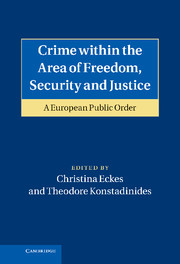Book contents
- Frontmatter
- Contents
- Contributors
- Acknowledgements
- ABBREVIATIONS
- Introduction
- 1 EU criminal justice: beyond Lisbon
- 2 The European Union policy against corruption in the light of international developments
- 3 The EU's anti-money laundering agenda: Built on risks?
- 4 EU anti-money laundering regulation: Multilevel cooperation of public and private actors
- 5 The legal framework of the European Union's counter-terrorist policies: full of good intentions?
- 6 Organised crime: developments and challenges for an enlarged European Union
- 7 The Europeanisation of extradition: how many light years away to mutual confidence?
- 8 The European Evidence Warrant: Mutual Recognition and Mutual (Dis)Trust?
- 9 Law and order and internal security provisions in the Area of Freedom, Security and Justice: before and after Lisbon
- 10 The external dimension of the EU's Area of Freedom, Security and Justice
- Index
- References
4 - EU anti-money laundering regulation: Multilevel cooperation of public and private actors
Published online by Cambridge University Press: 01 June 2011
- Frontmatter
- Contents
- Contributors
- Acknowledgements
- ABBREVIATIONS
- Introduction
- 1 EU criminal justice: beyond Lisbon
- 2 The European Union policy against corruption in the light of international developments
- 3 The EU's anti-money laundering agenda: Built on risks?
- 4 EU anti-money laundering regulation: Multilevel cooperation of public and private actors
- 5 The legal framework of the European Union's counter-terrorist policies: full of good intentions?
- 6 Organised crime: developments and challenges for an enlarged European Union
- 7 The Europeanisation of extradition: how many light years away to mutual confidence?
- 8 The European Evidence Warrant: Mutual Recognition and Mutual (Dis)Trust?
- 9 Law and order and internal security provisions in the Area of Freedom, Security and Justice: before and after Lisbon
- 10 The external dimension of the EU's Area of Freedom, Security and Justice
- Index
- References
Summary
INTRODUCTION
One of the most striking features of the current EU Anti-Money Laundering (AML) regulation is the multilevel cooperation of public and private actors. Not only are private parties expected to work against anti-money launderers and to report suspicious transactions under threat of administrative and criminal sanctions, they also take an active part in formulating the underlying rules and procedures on different levels. In short, traditional public tasks are shared by public and private actors. As a result, this regulatory field is extremely complicated, involving international, EU and national law, and embracing public, private and penal rules as well as enforcement mechanisms. Accordingly, the main aim of this chapter is to map out this regulatory field with its different stakeholders and law-makers. These include both public and private actors throughout the entire process, i.e. law-making, law implementation and law enforcement. In this respect, this chapter assesses Sweden and the UK, which serve here as case studies in order to provide some exemplifying and contrasting illustrations.
After briefly mapping out EU competence to regulate money laundering, the structure of the chapter will follow the three stages of law-making, law implementation and law enforcement, which of course are overlapping to a certain degree and in particular over time. Given the rapid policy developments within this field, the different phases are presented chronologically. The chapter will then point to a number of general issues of particular concern and a few specific consequences for the public-private divide.
- Type
- Chapter
- Information
- Crime within the Area of Freedom, Security and JusticeA European Public Order, pp. 97 - 126Publisher: Cambridge University PressPrint publication year: 2011
References
- 1
- Cited by



